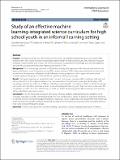Study of an effective machine learning-integrated science curriculum for high school youth in an informal learning setting
Author(s)
Rabinowitz, Gabrielle; Moore, Katherine S.; Ali, Safinah; Weckel, Mark; Lee, Irene; Gupta, Preeti; Chaffee, Rachel; ... Show more Show less
Download40594_2025_Article_543.pdf (2.559Mb)
Publisher with Creative Commons License
Publisher with Creative Commons License
Creative Commons Attribution
Terms of use
Metadata
Show full item recordAbstract
Abstract Purpose This study evaluates the effectiveness of a machine learning (ML) integrated science curriculum implemented within the Science Research Mentorship Program (SRMP) for high school youth at the American Museum of Natural History (AMNH) over 2 years. The 4-week curriculum focused on ML knowledge gain, skill development, and self-efficacy, particularly for under-represented youth in STEM. Background ML is increasingly prevalent in STEM fields, making early exposure to ML methods and artificial intelligence (AI) literacy crucial for youth pursuing STEM careers. However, STEM fields, particularly those focused on AI research and development, suffer from a lack of diversity. Learning experiences that support the participation of under-represented groups in STEM and ML are essential to addressing this gap. Results Participant learning was assessed through pre- and post-surveys measuring ML knowledge, skills, and self-efficacy. Results from the implementation of the curriculum show that participants gained understanding of ML knowledge and skills (p < 0.001, d = 1.083) and self-efficacy in learning ML concepts (p = 0.004, d = 0.676). On average, participants who identified as female and non-white showed greater learning gains than their white male peers (ML knowledge: p < 0.001, d = 1.191; self-efficacy: p = 0.006, d = 0.631), decreasing gaps in ML knowledge, skills, and self-efficacy identified in pre-survey scores. Conclusions The ML-integrated curriculum effectively enhances students’ understanding and confidence in ML concepts, especially for under-represented groups in STEM, and provides a model for future ML education initiatives in informal science settings. We suggest that policy makers and school leaders take into account that high school age youth can learn ML concepts through integrated curricula while maintaining an awareness that curriculum effectiveness varies across demographic groups.
Date issued
2025-04-19Department
Massachusetts Institute of Technology. Media LaboratoryJournal
International Journal of STEM Education
Publisher
Springer International Publishing
Citation
Rabinowitz, G., Moore, K.S., Ali, S. et al. Study of an effective machine learning-integrated science curriculum for high school youth in an informal learning setting. IJ STEM Ed 12, 23 (2025).
Version: Final published version